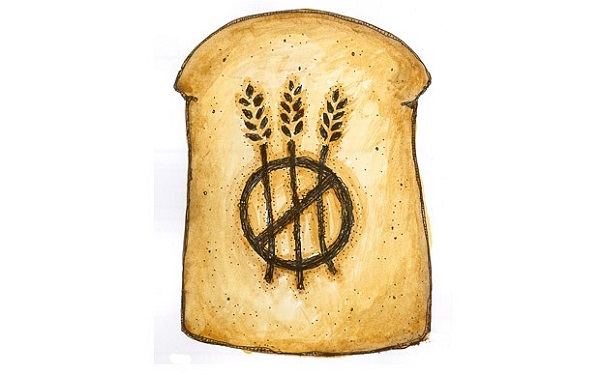Eating gluten, the naturally occurring proteins in wheat, barley and rye can be life-threatening to people with celiac disease.
Gluten refers to the proteins found in cereal grain’s endosperm (a type of tissue produced in seeds that are ground to make flour). Gluten both nourishes plant embryos during germination and later affects the elasticity of dough, which in turn affects the chewiness of baked products.
Gluten is actually composed of two different proteins: gliadin (a prolamin protein) and glutenin (a glutelin protein). Though "true gluten" is sometimes defined as being specific to wheat, gluten is also found in barley, rye and a grain that is a cross between wheat and rye called triticale, according to the Mayo Clinic.
Not all grains contain gluten, though. Some examples of gluten-free grains are sorghum, millet, brown rice, buckwheat, wild rice, amaranth, quinoa, corn (polenta) and teff. Oats are also gluten-free, but can be contaminated during processing, said Lori Chong, a registered dietitian.
Is gluten bad?
Gluten is only bad for certain people. These people are gluten-sensitive or gluten-intolerant, which means their bodies produce an abnormal immune response when breaking down gluten during digestion. About 18 million Americans have gluten sensitivity, according to the National Foundation for Celiac Awareness.
The most well-known form of gluten intolerance is celiac disease, which affects one in every 141 people in the United States, according to the U.S. Department of Health and Human Services. When someone with celiac disease consumes gluten, it triggers an immune response that damages their intestines, preventing them from absorbing vital nutrients.
The chronic gastrointestinal disorder called irritable bowel syndrome (IBS) is another condition that is affected by gluten. IBS affects 7 to 20 percent of adults in the United States, according to a paper published in the journal Gastroenterology & Hepatology. Chong explained that gluten grains are high in starches and sugars that can be easily fermented by intestinal bacteria. This can cause bloating, cramping and/or diarrhea.
Wheat allergy is a rare type of allergy that is marked by skin, respiratory or gastrointestinal reactions to wheat allergens but is not necessarily caused by gluten. According to the American College of Allergy, Asthma, and Immunology, 65 percent of children with a wheat allergy outgrow it by age 12.
Recently, scientists have become aware of another potential form of intolerance called non-celiac gluten sensitivity. After consuming gluten, patients with gluten sensitivity may experience many celiac disease symptoms, such as diarrhea, fatigue, and joint pain, but don't appear to have damaged intestines. These symptoms can be due to poor digestion or a placebo effect.
The effects of going gluten-free
In cases of gluten intolerance, doctors typically recommend a gluten-free diet. Patients must avoid eating any foods and ingredients that contain gluten, including bread, beer, French fries, pasta, salad dressing, soy sauce and even some soups (unless otherwise marked as "gluten-free").

In recent years, many people without gluten intolerance have taken up gluten-free diets.
First, it can affect weight loss. Food restrictions associated with a gluten-free lifestyle can help some lose weight, especially when starches are replaced by healthier options, like quinoa, which doesn’t contain gluten. “But it can also backfire – consumption of too much “healthier” gluten-free food can cause weight gain,” said Hegazi. Food manufacturers often include additional fat or sugar to make gluten-free products tastier, increasing the product’s calorie count and sometimes deceiving those using the diet to control their waistline.
Second, going gluten-free can cause nutrient deficiencies. Many whole grains are rich in vitamins and minerals, like vitamins B and D, iron and fiber. “Whether you need to be gluten-free as prescribed by a doctor, or you are choosing to cut back for personal reasons, a gluten-free diet is doable if followed carefully,” said Hegazi.
Third, some research suggests that a gluten-free diet may also affect cognitive function. Because gluten and carbs go hand-in-hand, going gluten-free can also mean cutting carbs. One study, which has generated a lot of discussions, suggests that elevated blood sugar levels may negatively impact brain structure and has been linked to cognitive decline and the development of Alzheimer’s disease. “In addition, studies suggest that high carbohydrate intake is linked to elevated blood glucose levels and inflammation, as well. So, cutting gluten and carbs from your personal menu can support cognition as you age. However, more research must be done to truly understand the impact of gluten on your brain,” said Hegazi.
Fourth, going gluten-free can improve digestion, reducing bloating and diarrhea, among other symptoms, that are often associated with the sensitivity. Improved digestion associated with a gluten-free lifestyle may also relieve symptoms associated with other intestinal disorders like lactose intolerance.








Deja tu consulta/Leave your query Cancel Reply